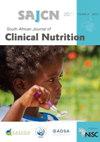Key role-players’ perceptions of the current salt legislation in South Africa: opportunities and challenges
IF 0.6
Q4 NUTRITION & DIETETICS
引用次数: 1
Abstract
Objective: A study was undertaken to determine the perceptions of key role-players regarding challenges and opportunities to move the South African salt-reduction strategy forward. Design: The study had a qualitative, exploratory design using in-depth, semi-structured interviews. Setting: South Africa. Subjects: A total of 12 participants from various fields within the salt-reduction strategy environment, including academia, government and policy-related institutions, research sector and non-governmental organisations, took part. Outcome measures: Consumer knowledge, consumer education programmes, multi-sectoral collaboration, research efforts and strategy recommendations were noted. Results: Overall perceptions of the current salt-reduction strategy in South Africa were positive. Most of the participants agreed that the current strategy is the best approach to reduce the salt intake of the South African population. Participants strongly believed, however, that the strategy is not currently reinforced and that the initial momentum is lost. Concerns were raised regarding the absence of consumer-awareness campaigns, the population’s lack of knowledge regarding salt intake and its relation to health, and the challenges around the monitoring of salt/sodium in processed foods. Participants also highlighted the lack of current studies in this field as well as existing data to be used for baseline studies. Conclusions: South Africa’s current salt-reduction strategy is the correct approach to decrease the population’s salt intake. The initial phase of implementing the strategy has been successful, but the current perception is that government is not following through with this strategy. Several key areas that are needed for this strategy to succeed are being neglected.关键角色对南非现行盐立法的看法:机遇与挑战
目标:进行了一项研究,以确定关键角色对推动南非减盐战略的挑战和机遇的看法。设计:该研究采用了定性的、探索性的设计,采用了深入的、半结构化的访谈。背景:南非。主题:共有12名参与者参加了减盐战略环境中的各个领域,包括学术界、政府和政策相关机构、研究部门和非政府组织。成果衡量标准:注意到消费者知识、消费者教育方案、多部门合作、研究工作和战略建议。结果:对南非目前减盐战略的总体看法是积极的。大多数与会者一致认为,目前的战略是减少南非人口盐摄入量的最佳方法。然而,与会者坚信,该战略目前没有得到加强,最初的势头已经丧失。有人对缺乏消费者意识运动、民众对盐摄入量及其与健康的关系缺乏了解以及对加工食品中盐/钠的监测面临的挑战表示关切。与会者还强调,目前缺乏这一领域的研究以及用于基线研究的现有数据。结论:南非目前的减盐战略是减少人口盐摄入量的正确方法。实施该战略的最初阶段是成功的,但目前的看法是政府没有贯彻执行这一战略。这一战略取得成功所需的几个关键领域被忽视了。
本文章由计算机程序翻译,如有差异,请以英文原文为准。
求助全文
约1分钟内获得全文
求助全文
来源期刊

South African Journal of Clinical Nutrition
NUTRITION & DIETETICS-
CiteScore
2.50
自引率
9.10%
发文量
21
期刊介绍:
1.The Journal accepts articles from all basic and applied areas of dietetics and human nutrition, including clinical nutrition, community nutrition, food science, food policy, food service management, nutrition policy and public health nutrition. 2.The Journal has a broad interpretation of the field of nutrition and recognizes that there are many factors that determine nutritional status and that need to be the subject of scientific investigation and reported in the Journal. 3.The Journal seeks to serve a broad readership and to provide information that will be useful to the scientific community, the academic community, government and non-government stakeholders in the nutrition field, policy makers and industry.
 求助内容:
求助内容: 应助结果提醒方式:
应助结果提醒方式:


